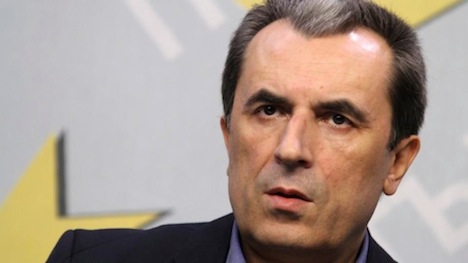The good news is that after months of uncertainty, Bulgaria has a new government.![]()
The bad news is that, in taking office, the new Bulgarian prime minister Plamen Oresharski warned his country that he wouldn’t make them rich and prosperous, but that he would work to ensure that over the course of his potentially four-year term in power, he would work to bring more hope and confidence that Bulgaria is ‘on the right track.’
Talk about lowering expectations.
After losing power in July 2009 just months after the global financial crisis, prime minister Sergei Stanishev and the center-left Bulgarian Socialist Party (BSP, Българска социалистическа партия) and its allies triumphed in the parliamentary elections earlier this month over his successor, Boyko Borissov and the center-right Citizens for European Development of Bulgaria (GERB, Граждани за европейско развитие на България).
So within two election cycles, Bulgarians have swung from the left to the right and, having indicated their dissatisfaction with both, are turning to a modified center-left government, with Oresharski, a former finance minister leading a semi-technocratic government supported by the Bulgarian Socialists and the third-largest party in Bulgaria’s parliament, the Movement for Rights and Freedoms (DPS, Движение за права и свободи), a liberal party that represents ethnic Turks and other Muslims.
Oresharski served as finance minister in Stanishev’s previous government from 2005 to 2009 in a career that’s spanned working in Bulgaria’s finance ministry since the early 1990s. As finance minister, he worked to lower the Bulgarian corporate tax rate to 10% in 2007 and then followed up with a flat-tax rate of 10% on all personal income in 2008.
As prime minister, Oresharski has appointed Petar Chobanov as his own finance minister. Chobanov himself is not technically a member of the Bulgarian Socialists, though he led the finance ministry’s forecasting agency under Oresharski in the previous government. Chobanov, like Oresharski, leans toward a conservative fiscal policy in a country that, unlike much of Europe, has a strong budgetary outlook — its public debt load is just around 18% of GDP. Nonetheless, Bulgaria hasn’t escaped the stagnant economic conditions that have plagued the rest of Europe, with GDP growth of less than 2%, an unemployment rate of 12.6% as of spring 2013, and an aging, declining population that’s shrunk by nearly 1.5 million since the 1980s. Bulgaria and its neighbor Romania remain the two poorest countries in the European Union.
The Financial Times and others are already calling Oresharski the ‘Bulgarian Mario Monti,’ but unlike in Italy, Oresharski’s government lacks the support of the major right-wing parties in parliament. Although his cabinet involves several non-partisan members, it doesn’t even make him the ‘Bulgarian Enrico Letta,’ the center-left prime minister who was appointed in late April as Italy’s prime minister with the support of Silvio Berlusconi’s party and conservative allies.
Given that the Bulgarian Socialists hold 84 seats and the DPS holds 36 seats, they don’t even have a majority — just 120 out of the 240 votes in the unicameral National Assembly (Народно събрание). GERB holds 97 seats and a far-right, anti-European, nationalist party called ‘Attack’ (Политическа партия Атака) holds 23 seats. Borrisov, the Bulgarian Socialists and their Turkish and Muslim allies have all consistent refused to govern in coalition with Attack, though Attack’s leader Volen Siderov indirectly supported the new government yesterday in order to allow Oresharski to take office.
All of this means that Oresharski will have a difficult time governing because at any time, GERB and Attack could bring his agenda to a standstill or bring his government down altogether.
Luckily for the rest of Europe, because Bulgaria and its 7.5 million citizens aren’t part of the eurozone, the political instability in Bulgaria won’t cause the kind of financial hand-wringing that results every time that Italy or Spain — or Cyprus or Greece — have a political crisis.
Unfortunately for Bulgaria, however, its currency is pegged to the euro and its national bank cannot set interest rates. So despite its relative healthy fiscal outlook, Oresharski and Chobanov will have limited room to maneuver to pull Bulgaria out of economic malaise. Aggressive monetary policy is not an option, and they’ll be extremely limited due to their razor-thin governing margin to enact the kind of reforms to modernize Bulgaria’s energy industry and reduce corruption. Many Bulgarians took to the streets in massive protests in the lead-up to the election in protest of several GERB scandals, lower standards of living and rising costs for electricity — a handful of Bulgarians even engaged in self-immolation protests.
One key member of the new government is Bulgaria’s new interior minister, Tsvetlin Yovchev, is a former official with the State Agency for National Security and he’s a former advisor to both Bulgaria’s president, Rosen Plevneliev, who is himself a former GERB cabinet minister in Borrisov’s government. Perhaps the most damaging of the scandals affecting Borrisov’s government is an illegal eavesdropping scandal, whereby Borrisov’s former interior minister Tsvetan Tsvetanov is accused of overseeing wide surveillance over Bulgaria’s top political and business leaders. Despite his ties to GERB, Yovchev is allegedly the victim of eavesdropping himself, and he’s indicated that he wants to make major changes to the interior ministry.
